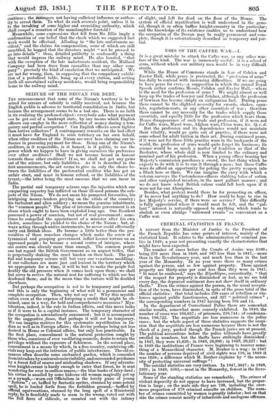USES OF THE C.A.FFRE WAR.—I.
IT is a great mistake to attack the Caffre war, or any other war- fare of the kind. The war is immensely useful : it is a school of arms, without which our military men would be in very difficult straits.
While the House of Commons stands in fear of Cobden and Exeter Hall, while peace is protracted, the " profession of arms" has daily to contend with increasing difficulties. If we are going to have peace for ever,—a supposition in which the annual Royal Speech rather confirms Messrs. Cobden and Exeter Hall, where is the need for the profession of arms ? We might almost as well keep up the trades of bowyer and fletcher, although the profession of bowman has become simply an antiquarian fact. During peace there cannot be the slightest necessity for swords, shakos, epau- lets, regulation-coats, or any other essentials of war ; therefore there cannot be any necessity for the trades which supply those essentials, and equally little for the profession which bears them. Hence disappearance of such trade and profession, if it were not for Caffre wars, Maori wars, Afghan wars, China wars, &c. Q. e. d. But the profession and its dependencies would not maintain their vitality, would go quite out of practice, if there were not some school for adult tuition in their art. During continued peace, if it were not for those little practice wars in the backyards of the world, the profession of arms would quite forget its business ; its science would be as much a matter of tradition as that of the Beefeater, whose whole skill is now limited to the culinary and nominal part of his profession. When a young officer bearing her Majesty's commission purchases a sword, the last thing which he expects to do with it is to run it through a man ; but these Caffre wars do afford an opportunity for poking the pretty weapon into a Black here or there. We can imagine the envy with which a veteran surveys the Customhouse-officers stabbing bales of cotton and other vanquished invaders, in the most gallant manner; and we do not know what British valour could fall back upon if it were not for our Aborigines. Besides, what pretext would there be for promoting an officer, if he never had anything to do ? How could he hope to rise in her Majesty's service, if there were no service ? This difficul is fully appreciated where it would most be felt, and the "
lent" interest is naturally opposed to anything which tends to abolish or even abridge "untoward events" so convenient as a Caffre war.


























 Previous page
Previous page